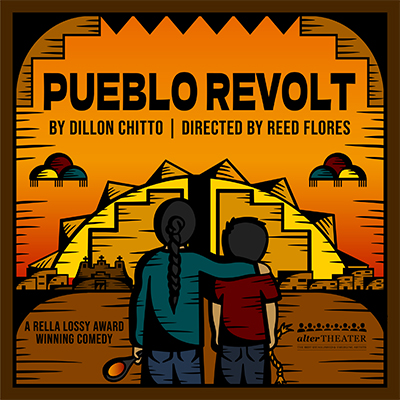Pueblo Revolt: Making the Past Present

This February, Alter Theater presented a production of Dillon Chitto’s new two-man play Pueblo Revolt. The play follows brothers Feem (Eduardo Soria) and Ba’homa (Steven Flores) as they live through the Pueblo Revolt of 1680. The Revolt occurred when the Pueblo people killed 400 invading Spaniards and drove the remaining 2000 invaders off their land. Pueblo Revolt tells this story from inside Feem and Ba’homa’s house, and through their eyes. At the opening of the play, the two come up with a plan to recruit all their surrounding villages to join together to drive out the Spanish, only to discover that someone else has thought of this idea first. For the rest of the play, we witness them negotiate their simultaneous desires to be both part of and safe from the revolt, and follow how their everyday troubles, like Feem’s inconvenient crush on the Spanish baker’s son, coincide with their involvement in the revolt.
Even as it presents a historical narrative, the play melds temporalities. There are nods to the present day, like when Feem mimes talking to the baker’s son using a rock instead of a phone, or when he refers to the land he and his brother inhabit as “the countryside,” before acknowledging that, in 1680, there is really no such thing. This feels like a tongue-in-cheek way of acknowledging the fact that a play set in the 1600s is using language from the present day, but it also appears to be nodding to a much deeper theme. The blending of time throughout the play works to make the issues it represents feel present. It underscores the fact that the struggles and oppression that took place so many centuries ago are still impacting the present and, indeed, are still occurring today. This choice, to have Feem and Ba’homa speak as we do today, rather than in some mimicry of seventeenth-century speech, makes them as characters more present to us as well. Native people are often historicized, made out to be mythical figures from the dawn of America, and not recognized as real living people with rights that are too often trampled on. The United States was birthed out of theft and violence, and the imperative to reckon with this original sin is far easier to ignore if Native people are relegated to the past. Pueblo Revolt refuses to allow for this.
Pueblo Revolt’s temporal immediacy is mirrored in the immediacy of its setting. The play takes place in one small room, with the audience seated around the acting space in the center of the room. The whole space is structured as if it is Feem and Ba’homa’s home, with pieces of art created to represent windows hung up on the walls behind the audience seating. This powerful choice invites the audience to become up-close and personal with both actors. We are not watching Feem and Ba’homa from a distance; we are sitting inside their home. This choice calls attention to the play’s theme of invasion, by forcing the audience to acknowledge whose land, whose home, they are occupying. At the same time, it allows intimacy to build between the actors and the audience.
The fact that this intimate setting is also a domestic space reflects another distinctive facet of the play: the decision to tell a wartime story about two men without resorting to a portrayal on the battlefield.The play gives us a nuanced view of the characters’ masculinity, with the loving bond between the brothers being a clear source of strength for both. They care for each other deeply and are expressive about their feelings for each other, and their bravest acts are motivated by this care, as when Ba’homa runs straight into the battle to find his brother.
Queerness is also foregrounded in the play. Feem has developed a crush on the baker’s son (a Spanish colonizer) and acts out imagined conversations with him. Ba’homa is aware and accepting of his brother’s queerness and wants to protect him from the judgment of their community, which has become intolerant since the Spanish arrived. Part of the brothers’ motivation for engaging in the revolt is a desire for Feem to be able to safely be open about who he is and who he loves. After the Spanish have left, however, they discover that the intolerance has remained. It is a powerful reminder of the way that the violence of colonization creates damage that lasts beyond even its seeming end.
Feem and Ba’homa find themselves longing for the days before colonization, imbuing that period with a kind of mythical perfection, even though neither they, nor any of their community, were alive during this time. In some ways, it seems a bit like a mirroring of the way that Native people are mythologized in the white American imagination. Fundamentally, though, the two phenomena are different. One is a malicious attempt at erasure in order to uphold an oppressive status quo. The other is a response to the trauma of colonization, and an attempt by Feem and Ba’homa (and by their wider community) to reckon with the fact that they can never undo what has happened.
This question — of how to carry on existing in the world when so much bad has been done — is left somewhat unanswered by the end of the play: the brothers end up separated by the conflict, with Feem joining the church and Ba’homa missing after venturing out into the fighting. This ending feels both tragic and honest in its ambiguity. It measures up to Alter Theater’s mission to “tell whole stories” — not shying away from painful truths but also not ignoring the love and joy and humor that people are able to find alongside the pain. Pueblo Revolt is, in itself, one answer to the question of how it is possible to deal with the continuing impacts of colonization: to make this history visible again, and to confront the ways that it impacts the present.